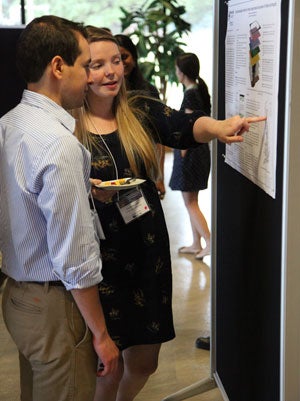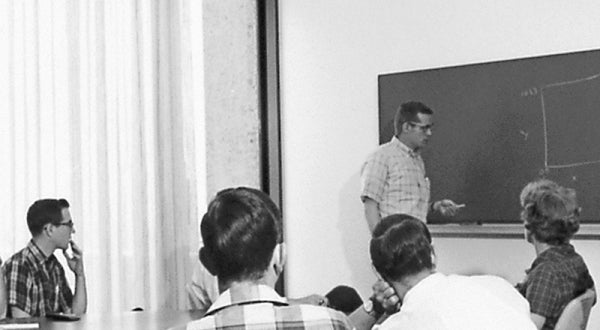A seedbed of greatness
NCAR's Advanced Study Program celebrates its 50th
Oct 1, 2014 - by Staff
Oct 1, 2014 - by Staff
October 1, 2014 | There's no pomp and circumstance on the agenda, but the staff and alumni of NCAR's Advanced Study Program (ASP) are taking quiet pride this autumn in the program's 50th anniversary. What began as a novel idea just four years after the founding of NCAR has become a renowned launch pad for the careers of hundreds of young scientists, many of whom are now leaders in weather, climate, and solar research.
ASP offers a unique two-year postdoctoral program that combines intensive mentoring and access to a wide range of experts with the freedom to explore innovative topics. More than 500 alumni of the ASP Postdoctoral Fellowship Program now occupy prominent positions within the atmospheric sciences community. These scientists can be found practicing in a broad range of disciplines at UCAR member universities; government, nongovernmental, and private organizations; and NCAR itself.
Along with its postdoc program, ASP offers graduate students the opportunity to make 3- to 12-month visits to NCAR in support of their university-based thesis research. In addition, ASP's Faculty Fellowship Program paves the way for university faculty to take NCAR-based sabbaticals and for NCAR scientists to do likewise in academia.
Supported by the National Science Foundation, ASP addresses mission-critical education and training goals of both NCAR and the foundation. Benefits accrue not just to the participants but also to NCAR and the science community, which gain highly trained researchers and an infusion of new ideas that emerge with each cohort of fellows.
According to ASP alumnus Russ Schumacher (Colorado State University), the program's focus on independent research is fundamental to its success. "The program puts a lot of power in the hands of a young scientist, which is invaluable. ASP fellows are encouraged to explore new ideas and allowed to find their own way to a large degree, but can also turn to some of the world’s top atmospheric scientists as needed," he said.
In the course of fostering emerging scientists, ASP promotes the examination of particularly timely topics, as well as areas that seem underemphasized relative to their importance. Toward this end, almost every year since 1966, ASP has hosted a summer colloquium that brings together graduate students and expert researchers in a given field for an intensive set of lectures. The colloquia foster interactions between scientists and graduate students and also provide an opportunity for professional peers working on similar issues to come together, typically for several days, midway through the multiweek agenda.

Julio Herrera Estrada (Princeton University) and Elizabeth Lewis (Newcastle University) discuss one of the research projects featured at a dinnertime poster session during the ASP 2014 Summer Colloquium on Uncertainty in Climate Change: An Integrated Approach. (©UCAR. Photo by Stephen Geinosky, NCAR.)
Uncertainty in climate change research was the focus of the 2014 ASP Summer Colloquium, held from July 21 to August 6. Although the basic role of human-produced greenhouse gases in raising global temperature is unquestioned, there remains a wide range of possibilities as to how future climate change will unfold, especially on local and regional scales. Sessions at this past summer's colloquium focused on the need to understand strands of uncertainty throughout the climate change problem in order to maximize the effectiveness of research focused in any one area, such as regional climate change or societal vulnerability.
"Research quality on any related topic is enhanced by having a more well-honed understanding of the bigger climate picture," explained Linda Mearns, an NCAR senior scientist and lead organizer of the 2014 colloquium on uncertainty. "We aimed to train up-and-coming scientists in interdisciplinary thinking, illuminate both the certainties and uncertainties related to climate change, and provide tools for dealing rigorously with the uncertainties."
"ASP colloquia provide a real service to the community by training the next generation of scientists," said Lance Bosart (University at Albany, State University of New York), who co-led ASP’s 2012 colloquium on the intersection of weather and climate. "Organizing and running colloquia is a difficult thing for a university to do. NCAR has the resources and experience and knows how to do it right."
Another tradition is the Thompson Lecture Series, launched in 1998 in honor of ASP founder Phil Thompson. The series brings prominent scientists to NCAR for short visits that feature interaction between the lecturer, ASP fellows, and other early career scientists at NCAR. Thompson Lecturers have included Nobel Prize winner Paul Crutzen (Max Planck Institute for Chemistry), Susan Solomon and Kerry Emanuel (both at Massachusetts Institute of Technology), Robert Rosner (University of Chicago), and the late Jerry Mahlman (who spent most of his career at NOAA's Geophysical Fluid Dynamics Lab and Princeton) among others.
In addition to giving a formal presentation, Thompson Lecturers offer research advice to the ASP postdocs and share their perspectives on scientific trends and priorities. In turn, they're briefed on emerging areas of research being investigated by the postdocs.
Leadership has been a critical part of ASP's half century of success. Alumni praise the lineup of past and present ASP directors for their excellent mentoring and listening skills, dedication to fostering early career scientists, and strong advocacy on the part of fellows during the program and beyond, as the fellows launch their careers.
Mary Hayden, an ASP alumna now working on health and climate issues at NCAR’s Research Applications Laboratory, credits ASP leadership for ensuring strong, ongoing ties between NCAR and program alumni.
"During my tenure as an ASP postdoc, I knew I had Director Maura Hagan’s full support for the work I was doing then, and to this day – although my postdoc has ended, and Maura is no longer the program director – she continues supporting the work I do," Hayden said. “This abiding interest from Maura is not unique to me, but is true for other ASP postdocs that Maura mentored, and likely contributes to the enduring connections between NCAR and its ASP postdocs.”
Current ASP director Chris Davis sees the ongoing interaction as essential for keeping NCAR strong and relevant.
“Outgoing ASP postdocs form an important part of the web connecting NCAR and universities,” said Davis. “We look forward to the research and career development possibilities that those ties represent, both for ASP alumni and successive generations of students and postdoctoral fellows.”

Students participate in a postdoctoral seminar at NCAR circa late 1960s. (©UCAR.)
Writer
Rachel Hauser, Office of the UCAR President
Funder
National Science Foundation